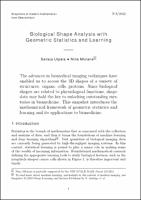Abstract
The advances in biomedical imaging techniques have enabled us to access the 3D shapes of a variety of structures: organs, cells, proteins. Since biological shapes are related to physiological functions, shape data may hold the key to unlocking outstanding mysteries in biomedicine. This snapshot introduces the mathematical framework of geometric statistics and learning and its applications to biomedicine.
